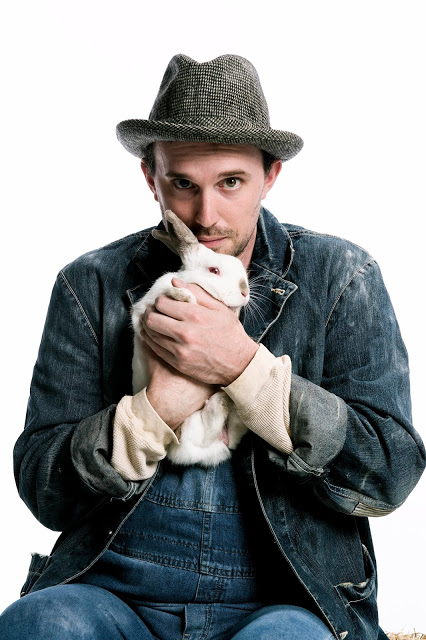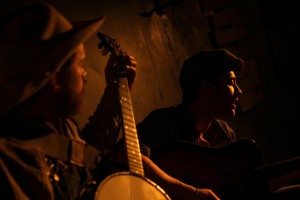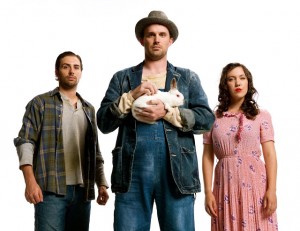At Little Mountain Gallery (195 East 26th) until October 26
www.brownpapertickets.com
Posted on October 12, 2013

Credit: David Cooper
John Steinbeck’s stage adaptation of his classic novella Of Mice and Men is a surprising choice for young director Genevieve Fleming. The play is so early 20th century American and so masculine it smells of dust and sweat: nine men, one woman. And the story doesn’t exactly deal with a universal human experience: a migrant field worker with a dream of owning his own spread is prevented from achieving this because he has taken under his protection a big, strong, mentally challenged sidekick. Wherever this hulking, simple-minded guy goes, things die: mice, puppies, and who knows what else as George (Sean Harris Oliver) and childlike Lennie (Sebastian Kroon) drift from farm to farm.
Probably what hooked Fleming is the beauty of George’s care of Lennie in spite of the endless frustration and trouble he causes him. The painful last act of kindness to which George is driven is one of those moments in the theatre that Tennessee Williams described as an audience united in a ‘universal sob’.
What is universal across time and place, however, is George and Lennie’s dream of land ownership, of being their own boss and having the freedom to do what they want. That longing is just as strong today as it was back in California during the Great Depression when Steinbeck sets his play.
Little Mountain Gallery is such an intimate venue that it doesn’t take much for set designer Jenn Stewart to make you believe you’re in a barn. You may find yourself checking the bottom of your boots before you leave. Add costumes by Christopher David Gauthier – well worn Levis and overalls – and you know where you are.

Credit: Matt Reznek
Fleming cranks up the ambience with two musicians on banjo and guitar (Matthew MacDonald-Bain and Malcolm Dow) who also provide sound effects including water splashing, breaking bones and one excruciatingly long-anticipated gunshot.
Sean Harris Oliver, as George, is dynamic; he moves quickly and reacts sharply with an air of desperation. Although we know there is softness in this character, we only see it when Lennie persuades him to tell – again and again – how life will be on their own farm where there will be, George promises, rabbits; Lennie’s compulsion, which leads to the tragedy, is to stroke soft things.
Sebastian Kroon’s Lennie is problematic. Kroon’s lumbering physicality is right on but the decision to make Lennie sound like a baby doesn’t feel right. Here’s the challenge: how do you make a tall, strapping, articulate actor sound mentally deficient without reducing him to baby talk. I don’t know and I expect Fleming and Kroon agonized over it. What Kroon does get right is Lennie’s bursts of happiness when he and George talk about “living off the fat of the land” on their own farm. Kroon lights up the whole place in those moments.
If Alec Willows were a piece of machinery, you’d oil him. His gravel-voiced, derelict take on Candy makes him almost endearing but you’d have to clean him up before you took him home. Jesse Martyn is so natural as clean-cut, decent Slim that you’d think Martyn had just ridden his horse in from Ashcroft. Robert Olguin makes his character, Carlson, as dangerous as barbed wire. Carlson’s despicable eagerness to shoot Candy’s old dog foreshadows the soon-to-unfold tragedy of George and Lennie.

and Christine Quintana
Credit: David Cooper
The trampy but lonely boss’s daughter-in-law is played by Christine Quintana who gets some sympathy for her character by revealing the poor young wife’s unhappiness and loneliness; bad marriage, no one to talk to, dreams in tatters.
Also in the cast are Matthew Bissett, Raes Calvert, Adrian Neblett and Amitai Marmorstein, whose natural softness and sweetness he struggles hard to conceal in the role of the pugnacious little prick Curley.
There is power in this play and in this production but it feels like a piece of early 20th century Americana now. Its greatest contribution is the introduction to audiences not raised on Steinbeck, to a major work by a major American writer. That’s justification enough for Hardline Productions to mount this 1937 American classic.

